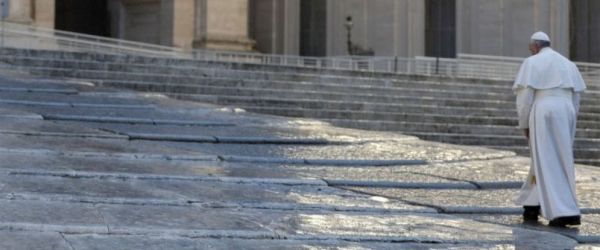Letting oneself slip slowly into sin, relativising things and entering "into negotiation" with the gods of money, vanity and pride: from what he called a "fall with anaesthesia" the Pope warned in the homily of the Mass celebrated at Casa Santa Marta on Thursday morning, 13 February, reflecting on the story of King Solomon.
The first reading of the day's liturgy (1 Kings 11:4-13) "tells us," he began, "the apostasy, let us say, of Solomon," who was not faithful to the Lord. In fact, when he was old, his women made him "turn aside his heart" to follow other gods. He was first a 'good boy' who asked the Lord only for wisdom, and God made him wise, to the point that judges and even the Queen of Sheba, from Africa, came to him with gifts because she had heard of his wisdom. "You can see that this woman was a bit of a philosopher and asked him difficult questions," the Pontiff said, noting that "Solomon came out of these questions victorious" because he knew how to answer them.
At that time, Francis continued, one could have more than one bride, which did not mean, he explained, that it was licit to be a 'womanizer'. Solomon's heart, however, was weakened not because he had married these women - he could do so - but because he had chosen them from another people, with other gods. And Solomon therefore fell into the "trap" and allowed it when one of his wives asked him to go and worship Camos or Moloc. And so he did for all his foreign women who offered sacrifices to their gods. In a word, 'he allowed everything, he stopped worshipping the one God'. From a heart weakened by too much affection for women, 'paganism entered his life'. Therefore, Francis pointed out, that wise boy who had prayed well asking for wisdom, fell to the point of being rejected by the Lord.
"It was not an overnight apostasy, it was a slow apostasy," the Pope clarified. King David, his father, had also sinned - strongly at least twice - but immediately repented and asked for forgiveness: he had remained faithful to the Lord who kept him until the end. David wept for that sin and for the death of his son Absalom, and when he fled from him before, he humbled himself thinking of his sin, when people insulted him. "He was holy. Solomon is not holy," said the Pontiff. The Lord had given him so many gifts but he had wasted it all because he had let his heart be weakened. It is not a matter, he noted, of the 'one-time sin' but of 'slipping'.
"The women caused his heart to deviate, and the Lord rebuked him: 'You have deviated your heart'. And this happens in our lives. None of us are criminals, none of us do big sins like David did with Uriah's wife, none of us. But where is the danger? Letting yourself slip slowly because it is a fall with anaesthesia, you don't realise it, but slowly you slip, you relativise things and you lose fidelity to God," Francis remarked. "These women were from other peoples, they had other gods, and how often we forget the Lord and enter into negotiation with other gods: money, vanity, pride. But this is done slowly and if there is no grace from God, we lose everything,' he warned again.
Again the Pope recalled Psalm 105 (106) to emphasise that this mixing with the pagans and learning to act like them, means becoming worldly. "And for us this slow slide in life is towards worldliness, this is the grave sin: "Everyone does it, but yes, there is no problem, yes, really it is not the ideal, but...". These words justify us at the price of losing our allegiance to the one God. They are modern idols," Francis warned, asking us to think about "this sin of worldliness" that leads to "losing the genuine of the Gospel. The genuine of the Word of God" to "losing the love of this God who gave his life for us. You cannot be right with God and right with the devil. We all say this when we talk about a person who is a bit like this: 'This one is well with God and with the devil. He has lost faithfulness'.
And, in practice, the Pontiff continued, this means not being faithful 'neither to God nor to the devil'. Therefore, in conclusion, the Pope urged to ask the Lord for the grace to stop when one realises that the heart begins to slip. "Let us think of this sin of Solomon," he recommended, "let us think of how that wise Solomon fell, blessed by the Lord, with all the inheritances of his father David, how he fell slowly, anaesthetised towards this idolatry, towards this worldliness, and his kingdom was taken away from him.
And "let us ask the Lord," Francis concluded, "for the grace to understand when our heart begins to weaken and slip, to stop. It will be his grace and his love that will stop us if we pray to him."
[Pope Francis, St. Martha, in L'Osservatore Romano 14/02/2020]












